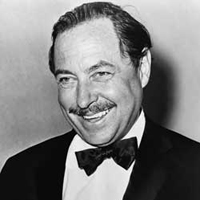Tennessee Williams - Biography and Works
Tennessee Williams (1911-1983) was born in Columbus, Mississippi as a son to the former Edwina Estelle Dakin and Cornelius Coffin Williams. His father was a travelling salesman for a shoe company. He could trace his ancestry back to the French Huguenots, and to politicians and soldiers in North Carolina and Tennessee.

Tennessee Williams (1911-1983)
Tennessee Williams is a leading modern dramatist. He ranks with two other leading modern American dramatists Eugene O'Neill and Arthur Miller. Typically, he is known as, the successful post-World War II American playwright. It is said that there was a great deal of coldness between him and his father.
Williams was brought up in his grandfather's home where his parents lived. Williams's Deep South accent and poverty made him a target of his schoolmates and earned him later from his university classmates the nickname "Tennessee". In 1928 Williams traveled with his grandfather to Europe and inspired by its atmosphere and culture he wrote much poetry. He entered college during the great American depression 1930s.
The family's lack of funds forced him to leave after a couple of years and take a job in the same shoe company that employed his father but he hated that job. Williams had started to write in his childhood and continued to produce short stories while still working at the factory. When his health broke down, he was sent to live with his grandparents in Memphis. As a playwright Williams began his career while studying at the University of Missouri and Washington University, St. Louis. During this period he became aware that he had a homosexual tendency. In an interview Williams confessed, that he had his first consummated homosexual love affair at the age of 28.
Tennessee Williams was brought up in the South, we can clearly see an element of the southern literary tradition in his work. The elements like complicated feelings about time and the past. The past is usually looked upon with sadness, guilt or fear. He describes his society as a kind of hell of brutality and race hatred. After the arrival of Eugene O'Neill, the practice of realism and naturalism and was established as a trend for some time in the field of plays and among the many playwrights; one of them is Tennessee Williams. The language of his play is sometimes close to poetry. Therefore, he is the poet of unpoetic land. Because of the poetic use of language we realize he is influenced by Ibsen's drama.
Tennessee Williams tries to express, internal reality and that make him near to Anton Chekhov. In Chekhov's drama the realization of the action is there which is eternal and in Tennessee Williams drama the realization of tension and anxiety which is internal. Tennessee Williams reached his peak relatively early in his career- in the 1940 with The Glass Menagerie (1945) and A Streetcar Named Desire (1947). None of the works that followed over the next two decades and more reached the level of success and richness of those two pieces. Williams wrote more than twenty full- length dramas, many of them autobiographical. Even the drama The Glass Menagerie is taken as autobiographical drama. This drama does not only stand for autobiographical drama, but it stands as fertile land. The life of the character in The Glass Menagerie when becomes hot livable or not acceptable, then the characters turn themselves to live in the illusion. Tennessee Williams revealed the pain and suffering in the heart of his characters. He tries to explore the internal heat, which is opposite to the behavior of daily life. In A Streetcar Named Desire the character Blanche Dubois is suffering from nymphomaniac, who has the excessive sexual desire. When she is married, her unfulfilled sexual desire is not fulfilled. In this drama Williams tries to show how the human beings are victimized by their excessive sexual desire. Here Dubois is not corrupted by love, but by the life she has. Tennessee Williams experiment non – realistic technique to present the mental conflict and tension.
Tennessee Williams Study Center
Lord Byron's Love Letter (One Act Play)
The Timeless World of a Play (Essay)
 |
bachelorandmaster.com |